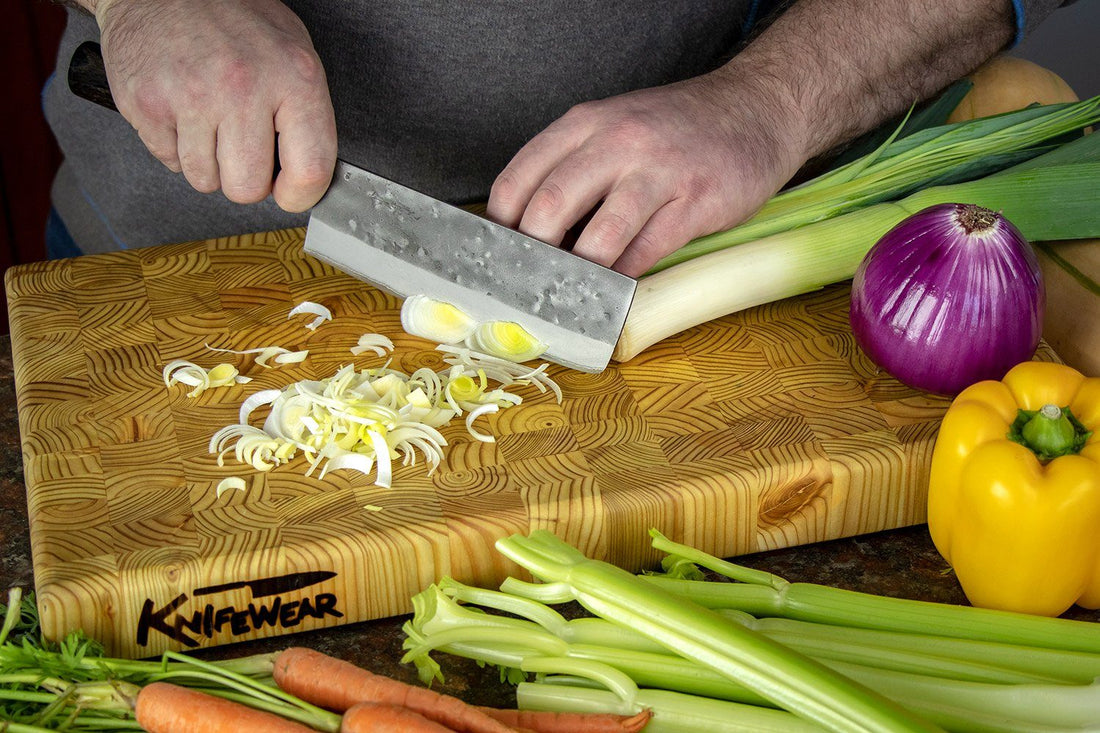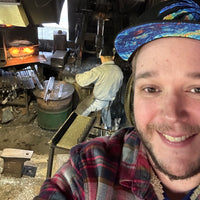
Knife Care: Why Everyone Needs a Larchwood Cutting Board
It’s easy to become a knife nerd. Using a ridiculously sharp knife can be an eye-opening experience. The silky glide of a thin, sharp knife through a tomato is downright cathartic. But how do you keep your knife sharp? Before you check out our pal Naoto’s video on how to sharpen your knives by hand, there’s a much more simple solution to helping your blade stay sharp; use a kickass cutting board!
A well made cutting board is clutch. Every knife nerd or foodie knows this. But why? There’s a lot more to it than having one for aesthetic purposes (although some of the nicest ones do look amazing). At Knifewear, we’re big fans of wooden end grain boards. Let’s take a look at why these guys are so amazing.
Good Cutting Boards Help Your Knives Stay Sharp Longer
This is a big one. A lot of commercial cutting boards are really hard, too hard. Composite woods, laminated wood, bamboo, and (ugh) glass cutting boards are really rough on the edge of your knife. Every time you slice into something that is around the same hardness as your knife, your knife gets dull. It’s a simple fact. Wood cut across the grain—so you can see the rings of the tree—doesn’t drag across your knife the way other materials do. Even harder woods like walnut make excellent cutting boards as long as they’re cut across the grain. Those grains allow for a little give, so the edge of your knife cuts into it rather than scraping it along the surface. Presto-change-o, you knife stays more sharp-o!

Wooden Boards are Easy to Clean and Sanitary
This one may seem counter intuitive, but believe me, it’s 100% true. As long as you take good care of your end grain board, it actually repels moisture and bacterial growth. It’s very important to keep your board moisturized. We recommend Knifewear Board Wax, but any food grade non-perishable mineral oil will also work. (Don’t use olive oil or other cooking oil, it will spoil and get smelly.) Simply apply a bit of wax once a week for the first month, then once a month after that. More often if you’re washing your board a ton. Let it sink into the board overnight and buff it dry with a towel in the morning. This keeps the board saturated with wax, thus it’s less likely to absorb any of the moisture from your food.
Because the fibres of end-grain boards face upwards, cuts into the fibres can close up over time and make it much less likely for schmutz to get stuck in them. Trees have evolved antibacterial properties, and studies have even been done that show wooden boards to maintain many of those properties. Bacterial growth was actually shown to decrease over time on wooden boards v.s. plastic. That said, it’s important to always wash the board with soap and water, and also not a bad idea to sanitize it after doing nasty stuff like chicken and fish. I use a solution of a 1:1 ratio water to vinegar. Spritz it on, have a beer, wipe it off. Then reward yourself with another beer.
Plastic boards, while not too harsh on the edge of your knife, are really lacking in the cleanliness department. The gashes you cut into your plastic board don’t close up the same way and act as bacterial hotbeds! Have you ever chopped parsley on a plastic cutting board? That big ol’ green stain is damn near impossible to scrub out. This actually happens with everything you’re cutting, you just can’t see it as clearly. GROSS GROSS GROSS. They’re built with price point in mind over quality, and aren’t meant to last forever. Despite that, you can expect them to sit in a landfill for centuries after you’re done with them. I'm not a fan.
Wooden Cutting Boards Last Forever! (Almost…)
“If you buy the right tool once, take care of it. You’ll never need to buy it again.” This is my personal shopping credo! The fine folks at Larchwood Enterprises based out of Cape Breton seem pretty confident that the cutting boards they produce should last around 150 years. Granted, I have not yet had the time to truly put this claim to the test, but they seem to know their stuff. Head on over to your local butcher shop and ask them - there’s a reason professional meat cutters love these boards! I’ve personally had the same cutting board in my kitchen for years, and it still looks just like the ones we have wrapped up here in the shop. Just make sure you’re showing them the care they deserve - keep them waxed, clean them after each use with soapy water and a scrubby. Keep them away from flames (duh), and don’t put hot stuff on top of them. Pretty easy, right?

They’re Pretty
Yes, yes, I know. I said they’re not just for looks, but that doesn’t mean that that they should be a bunch of ugg-os. True story - at Larchwood Enterprises, there is one person in the workshop assigned to examining the grain of all the squares they cut, then lining them up so that the boards have a pleasing wood grain flow. Tell THAT person that looks aren’t important!
A lot of people ask me how you should store these boards. I simply leave mine on the countertop at all times. It’s one of the prettiest things in my house, why would I want to hide it away? Also, they’re all fitted with little rubber feet so you don’t need to worry about them scratching up your countertop or sliding around with use. Smart!
They’re Sustainable
Larchwood Enterprises knows what’s up. Larch is both native to the region where the boards are produced, and it is a prolific species of tree. Every step of the process is done on site - they literally start with logs, and finish with cutting boards. This is a big part of the reason why the price point is so good. Not only do they have a super-efficient workshop, but the raw product they work with is locally grown, and readily available. This also helps keep their carbon footprint low.
It’s a good idea to avoid exotic wood cutting boards for reasons other than sustainability. Some woods like teak, a popular and gorgeous wood, has silicates naturally occurring in the grain which can dull knives like mad. Spalted woods (woods that are coloured naturally through fungal growth) are not recommended, and many types of cedar give off a chemical that wards off insects which can be toxic to humans.
So there you go! If you love to cook, love your knives, love food, love products built to last, and love the environment, end grain wooden boards are easily the best way to go. Once you’ve decided that a Larchwood board is the answer, you can check out our full selection.
Happy Chopping!







